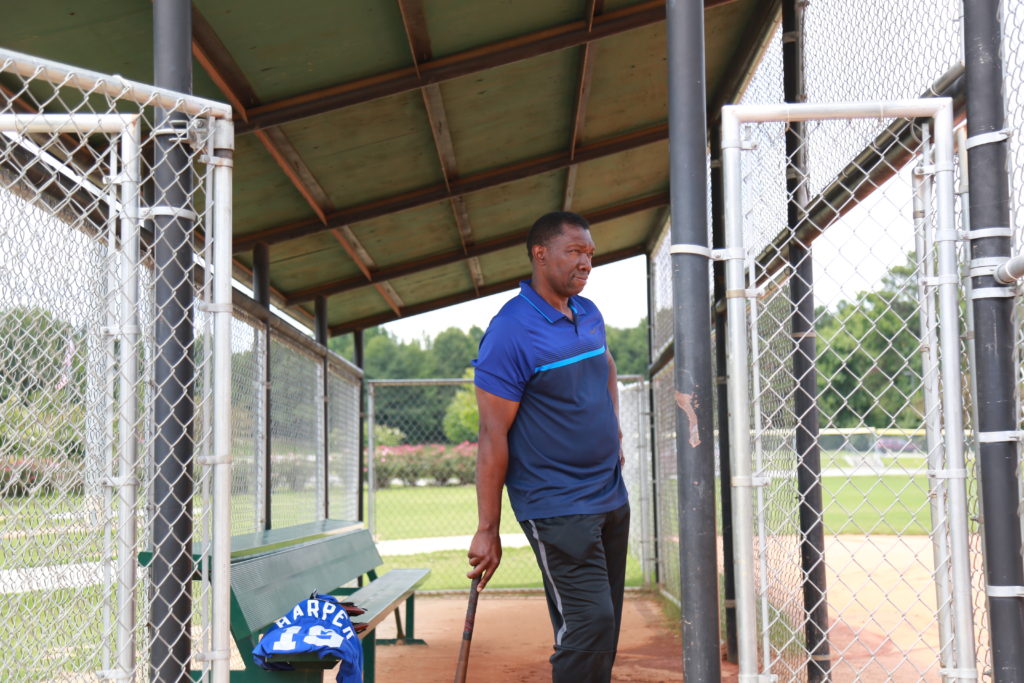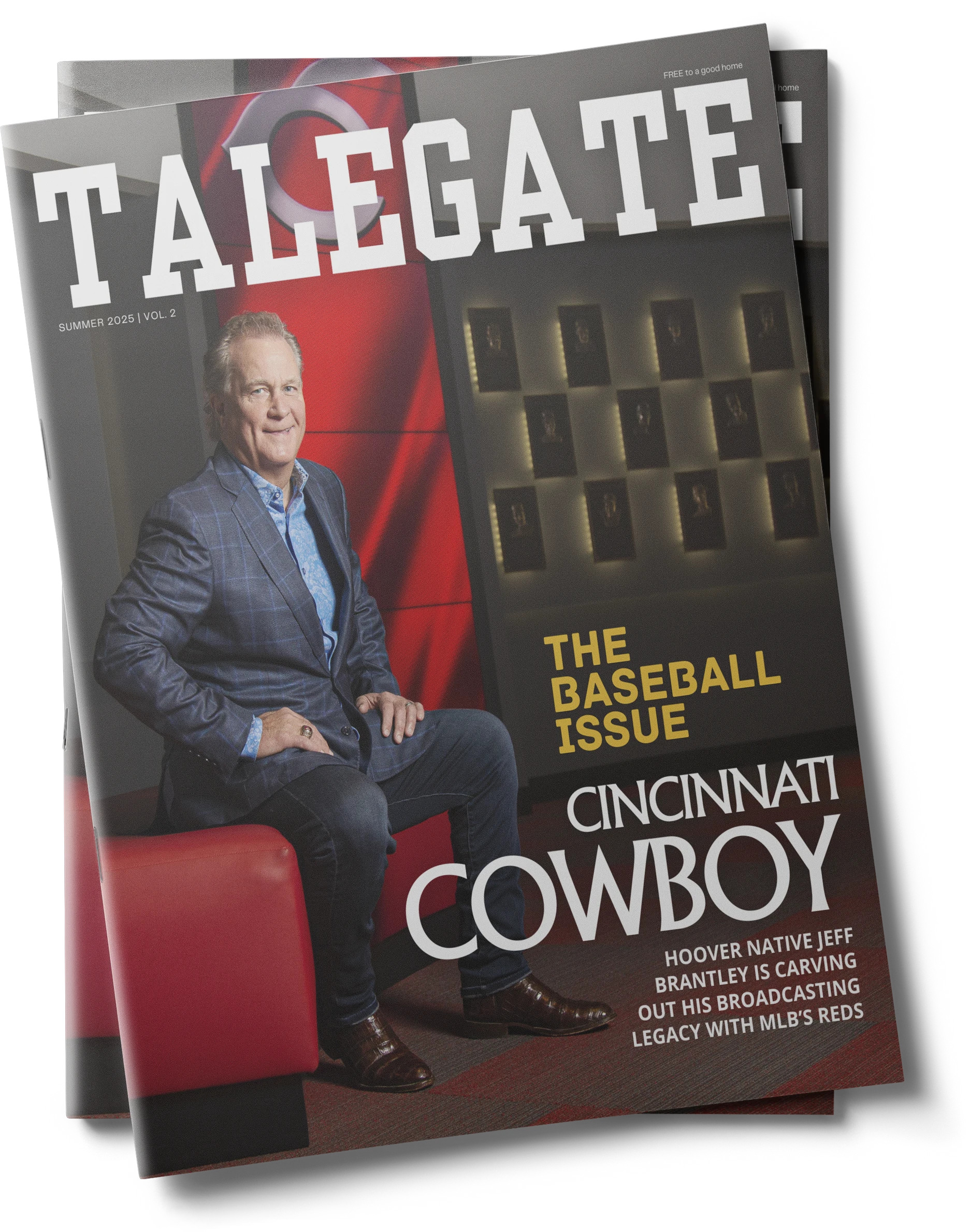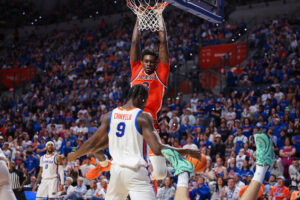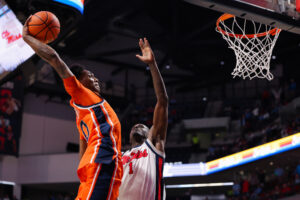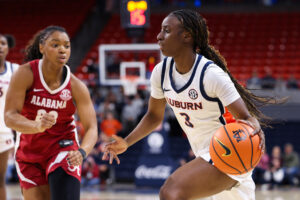They were the “Lovable Losers.”
Long ago, before 14 straight division titles, a World Series championship, and the most dominant trio of starting pitchers in the modern baseball era, the Atlanta Braves were bad. Really bad. They wore scratchy, powder blue togs and socks with stirrups. The logo was not a tomahawk, but a smiling Indian with mouth agape. Known as “America’s Team,” the 1980s Braves were often terrible, yet terribly beloved.
Pitiful as they often were, the Braves teams of that era summoned loyal fans who expressed their zealotry in living rooms all across the Bible Belt. Grandfathers, slumped back in La-Z-Boys to take in the daily broadcast on “SuperStation” WTBS, spent afternoons and evenings with pals Pete Van Wieren, Ernie Johnson, and Skip Caray, coming to you from the booth in Fulton County Stadium. Millions of Southern children grew up with the clean-livin’ Dale Murphy as their hero, and often the Braves lineup could have been as easily recited as the epistles of Paul. In the infield there was Bruce Benedict at catcher, Bob Horner or Chris Chambliss at first. There was Rafael Ramirez, vaccuming up ground balls at short and batting a punishing .240. There was Glenn Hubbard at two-bag and Ken Oberkfell at hot corner. In the outfield there was Claudell Washington, Murph, and our subject, Terry Harper. Pitchers Gene Garber, Rick Mahler, and Zane Smith anchored a rotation of relative mediocrity. Yes, the fields of winning were fallow, yet for a few short years, these teams brought joy to our uneventful, humdrum lives.
Harper, one of the less notable names on the Braves roster during that time, platooned in the outfield and quietly cobbled together a seven-year career with the Braves from 1980-86. His stats are not eye-popping, and his memory is somewhat buried in the hundreds of pages of stats and old yellowing baseball card sets stuffed in cobweb-strewn attics or handed down to children.
So why is his name resurfacing now? Because over the last 30 years, Harper has helped literally hundreds of athletes across a broad spectrum of talent—from MLB’s Chipper Jones and Dexter Fowler to 6-year-olds with a speck of hope—in the fundamentals of hitting and fielding. Without fanfare or want for recognition, he has quietly devoted his post-baseball life to helping young people achieve their dreams.
Terry grew up modestly in Douglasville, Ga., a former rural community whose population has experienced a 30-year upward thrust as the cup of Atlanta’s population runneth over. Sundays after church, Terry would play baseball at the local park or in the backyard with his brother and his sister’s husband. His first experience was as a batboy, but later he worked himself into his first game in nearby Powder Springs. Terry’s first organized team was the Douglasville Rebels, a 12-year-old squad coached by Dennis Chandler, the man who should be credited for teaching Terry how to pitch. “I had a pretty good arm,” Terry recalls. “But I wouldn’t want to stand there and hit against me because I was all over the place. I just threw hard. I didn’t have any idea where it was going.”
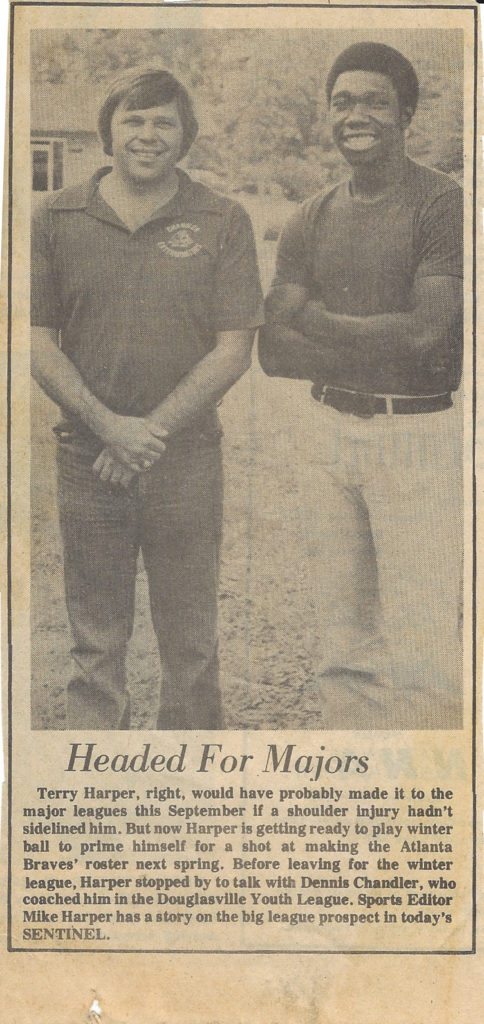
Terry made the varsity team at Douglasville High when he was in the ninth grade. He’d get in a few games here and there, and every now and then he’d be called on take to the mound. Ron Burchfield, Terry’s high school coach, saw potential and encouraged him to play at the local park & rec league at Hunter Park. This spurred Terry to success in his 11th– and 12th-grade seasons, and he was later named MVP of his high school team and Georgia Player of the Year. Terry remembers that he hit around .450 his senior year.
The Baltimore Orioles were the first Major League team to show interest in him. “When I was 16, scouts were starting to show interest,” Terry said. “The Baltimore Orioles sent me a letter—come to Macon for a tryout.”
Terry had never really thought about pro ball before, and the prospect of trying out for a Major League club was exhilarating. While in Macon, Terry doesn’t remember ever swinging a bat and says he was “wild as a buck” on the mound. As it turns out, another team, much closer to home, was eyeing him, too.
As the story goes, Paul Snyder, the Atlanta Braves assistant minor league director, set up a lunch with Coach Burchfield and Terry to, as Terry says, “size [him] up and see what kind of person [he] was.” At the time, Terry had no idea the Braves were interested and thought that if he signed anywhere, it would be with Baltimore.
“So when the Braves drafted me, it was a big surprise,” Terry said.
On June 5, 1973, Harper was drafted as a pitcher by the Braves in the 16thround of the amateur draft. Terry spent the next seven years in the Braves minor league system, where he eventually transitioned from a pitching prospect to an outfielder.
Terry’s minor league career began with the Wytheville (Va.) Braves of the Appalachian League. After a year of rookie ball, Harper was sent to the Braves Single-A minor league affiliate in Greenwood, S.C. Many future Atlanta Braves players who became famous in the 1980s—including Murphy, Mahler, Ramirez, and Benedict—passed through Greenwood.
One memory of Terry’s time in A-ball was an opportunity to meet his boyhood idol, the great Willie Mays, when Mays made an appearance in Anderson, S.C. On this particular day, Mays was signing autographs down the right-field line by the clubhouse when Harper approached Mays, hoping to exchange pleasantries. But instead of a friendly conversation, Harper perceived Mays to be inconsiderate. “I wanted to say a few words to him, but I kind of feel like he blew me off. So I was a little bit disappointed,” Harper said. “I never got a chance to talk to him again.”
From Greenwood, Harper toured the Braves’ minor league circuit. In 1977, he went to Savannah, and in ‘78, Richmond. In 1979 and ’80 while in Richmond, Harper logged the most significant number of games in his minor league career (248 total) and batted .303 and .279 in consecutive seasons. With each vertical move up the minor league chain, Harper felt the rub of elevated competition—“by the end of the year, I felt like the pitcher could knock the bat out of my hand!”
The grind of the minor leagues was tough, so Harper admits, but it prepared him for the eventual call to the Major Leagues. There was nothing like playing 22 innings in Syracuse, N.Y., bussing two-and-a-half hours to Rochester, spending the night in a rinky-dink hotel and the next night playing 15 innings. There was little time off, and no time to think. Harper remembers waking up in the blaze of summer just praying for rain. And whoa, were the minors loaded with talent! “A lot of guys I passed up were a lot better than I was,” Harper said.
Terry anticipated being called up in ’79, but those plans were thwarted when he dislocated his shoulder diving for a baseball. Finally, one day in 1980, the Majors called.
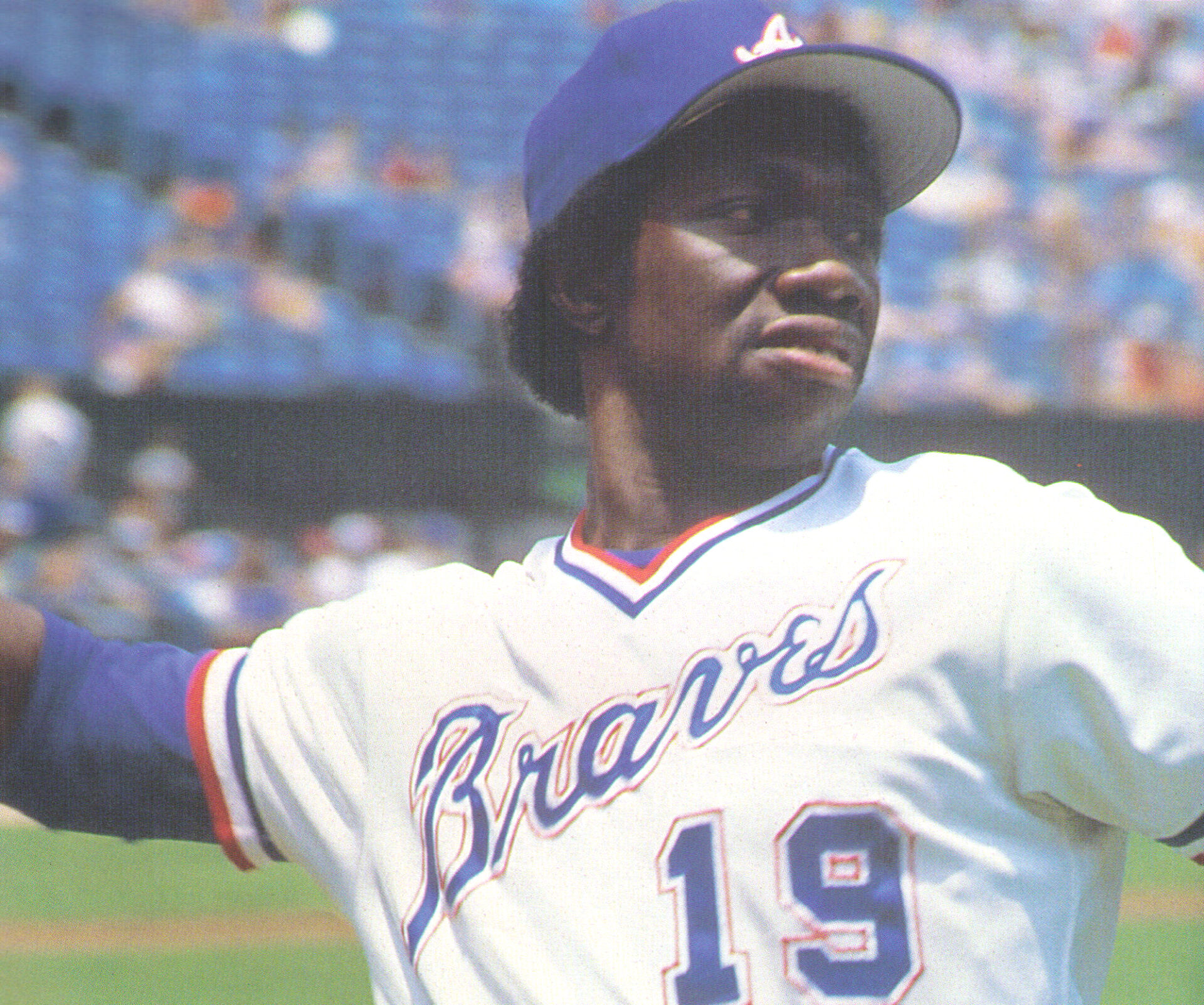
Before Bobby Cox led the Atlanta Braves to a World Series championship in 1995 and 14 straight division titles, he managed the Braves during a short stint from 1978-81. And when Terry Harper was called up for 21 games during the 1980 season, Cox was his first manager.
Terry notched his first major league hit on Sept. 13, 1980, against San Diego Padres pitcher Rick Wise. No one was prouder than Terry’s father.
Back in Douglasville, Willie Joe Harper, Terry’s dad, was a big Atlanta Braves fan. Terry describes his father as a “quiet man but a prideful guy” and when Terry was a child, Willie Joe would carry his transistor radio around the house and fuss at the Braves’ game (this was around the time of Hank Aaron, the Niekro boys, and Dusty Baker). But there was no fussin’ the day Willie heard his own son’s name come across the radio waves as a player for the Atlanta Braves. Terry says that every time he did something good in a game—a base hit, a good defensive play—he would always think about his father. So that night in San Diego, as Terry stood on the bag as a 25-year-old man enjoying his first Major League hit, he imagined the pride his father must have felt as he clutched that transistor radio.
The next season, Terry played in 40 games and hit .260 but was shipped back to Richmond. For the next several seasons, Terry played sparingly for the Braves, platooning when players like Brett Butler went into a .220 slump. In the majors, Terry couldn’t quite seem to get over the hump, but back in the minors, he was a terror. In Richmond during the 1982 season, Terry led the International League in batting (.386) and RBI (41), and slugged 9 home runs.
When he was called up, the new Braves manager, Joe Torre, was encouraging, but Terry never logged any consistent playing time under Torre.
During the early part of the 1980s, the Braves were enjoying a period of success, but after Torre was fired in 1984, the team went into a tailspin. The Bravos went 66-96 in 1985 under managers Eddie Haas and Bobby Wine, but Terry enjoyed his best season. He played in 138 games, hit .264, collected 130 hits, scored 58 runs, and drove in 72 more. In addition, Terry hit 17 home runs and 15 doubles.
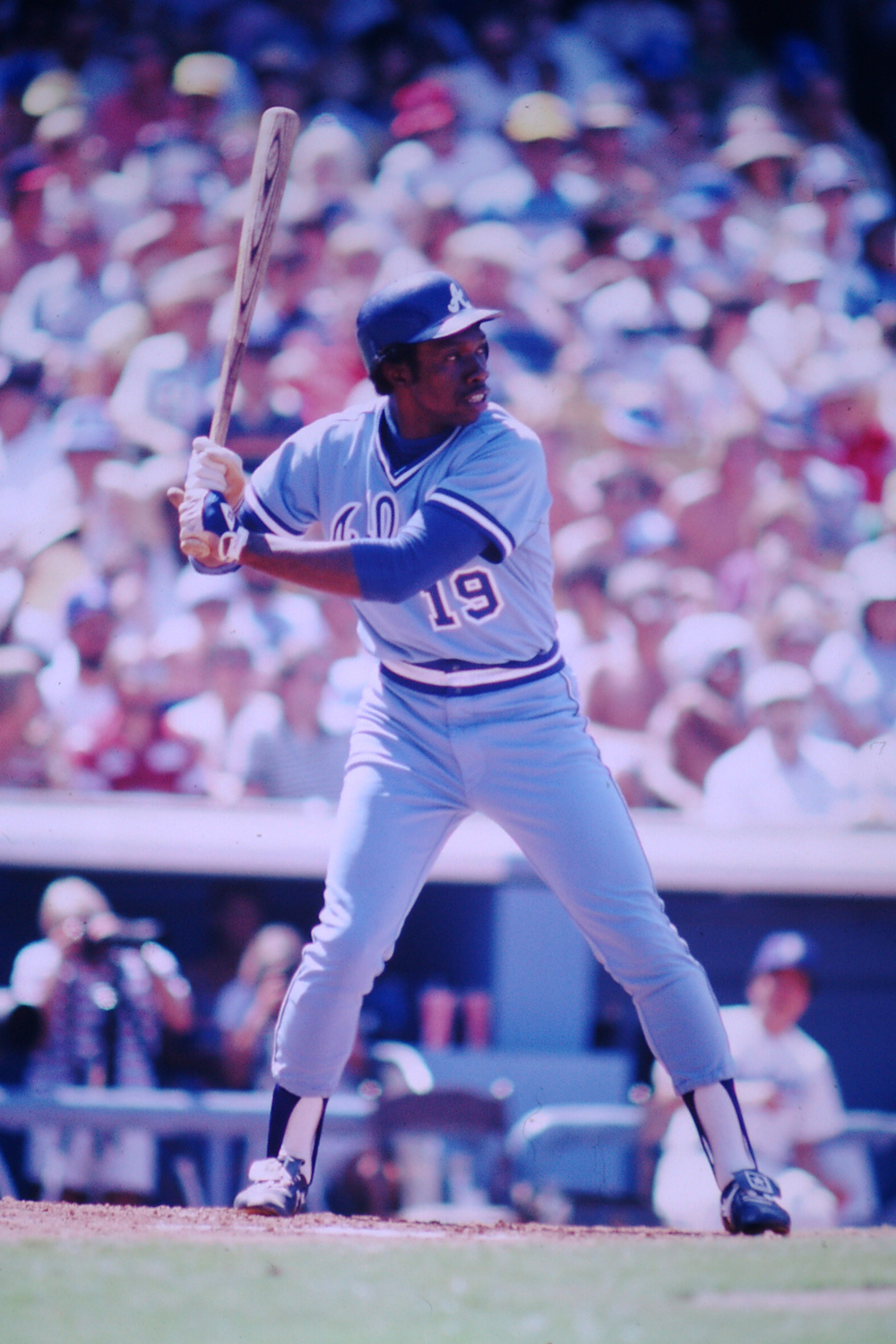
Terry attributed his breakout year to Haas, who had known Terry since his minor league days in Savannah. “He knew what I could do,” Terry said. “He just let me play, and that’s when I had my best year. If I would have been there the whole year, I feel like I could have hit 25 or 30 homers.”
The Braves continued to struggle in ’86 under new manager Chuck Tanner, but Terry continued to play, securing a spot in left field for much of the season. Beside him in the outfield was No. 3 Murphy, one of the most popular players in franchise history.
The Braves enjoyed a great camaraderie, and Harper was a well-liked member of the team. He says was probably closest to guys like Gerald Perry, Washington, and Chambliss, but considered Murphy a great friend, too. The team greatly enjoyed traveling together and were not always choir boys on the road. They were baseball players who were well-known and liked to have a good time. One of the best memories was the annual team party, often held in San Diego. “It was something else,” Terry said. “We’d have rookies dress up like girls. There’s some stories I can’t really tell. Even some of the announcers…they had fun, too. We had a great time.”
Ted Turner, who purchased the Braves in 1976, committed himself to the franchise’s comeuppance by being an involved owner. After dubbing the Braves “America’s Team,” Turner pumped Braves’ games to millions of households throughout the country on his pride and joy, “Superstation” WTBS out of Atlanta. He chartered planes, had feasts prepared at his Alpharetta estate, and generally helped the Braves to live like kings. Terry remembers Turner as “just one of the guys.” “Back then, Ted was with us all the time,” Terry recalls. “He was on most of the flights. He played cards with us. He’d be dipping snuff and have a little thing to spit in. What was neat about it was, the way Ted was, you would have never thought he was Ted Turner. Ted just wanted to be one of us.” It was a rollicking time.
But for Terry, his playing days in Atlanta eventually came to an end. Before the 1987 season, Terry was shipped to the Tigers in exchange for pitching prospect Randy O’Neal. He joined a team that was only three years removed from a world championship and still loaded with players like Alan Trammell, Lou Whitaker, Jack Morris, and Kirk Gibson. The team was managed by the tightly wound Sparky Anderson, who’d already claimed three World Series of his own and was a baseball legend. Halfway through the 1987 season, Harper was traded to the Pittsburgh Pirates for Pete Rice and Shawn Holman. In Pittsburgh, he joined a team with young sluggers Barry Bonds and Bobby Bonilla, who, along with Doug Drabek and Andy Van Slyke, formed the nucleus that would eventually lead the Pirates to a division championship in 1990.
Terry remembers that he would often pinch hit when the Pirates were facing a tough lefty. One such instance was against a young rookie from Concord, Mass., Tom Glavine, who was pitching for Terry’s old team, the Atlanta Braves. Though Glavine only made nine appearances that year, his one against the Pirates left an impression on Harper. “He mowed us down,” Terry said. “I swear, he went through us like a hot knife through butter. It seemed like that game didn’t last but about an hour and a half.”
During his career, Harper faced a bevy of Hall of Fame pitchers: Nolan Ryan, Tom Seaver, and Steve Carlton, to name a few. Ryan, Terry says, was particularly hard when the ball came screaming at you at over 100 miles per hour under the dim light of the Astrodome.
When the ’87 season was over, Terry, tired of playing only part-time, opted to play professional baseball in Japan. That year, he signed with the Yakult Swallows of the Nippon Professional Baseball League.
After playing only one year overseas, Terry set his sights on returning to the big leagues and even had a contract inked with the Houston Astros. But because of a nagging knee problem, he couldn’t pass his physical. His professional baseball career was over.
Terry doesn’t look back on his playing days with any sense of regret or wonder had he done this or that that things might have been different. He doesn’t feel as though he could have worked a little harder, pressed a little more, and he might have been an everydayer. Instead, he reviews his Major League career thusly: “To me, if you make it to the big leagues and spend just a little bit of time in the big leagues, I think that’s quite a feat. On that journey to get there, you see guys with so much talent that it’ll make your mouth fall open, but they never make it. Actually I kind of look back and think about some of the guys who didn’t make it and I think, what made me different to where I kept progressing, and some of the other guys had just as much talent or more talent than I had, and they didn’t get the opportunity. So I feel blessed to get the time that I got.”
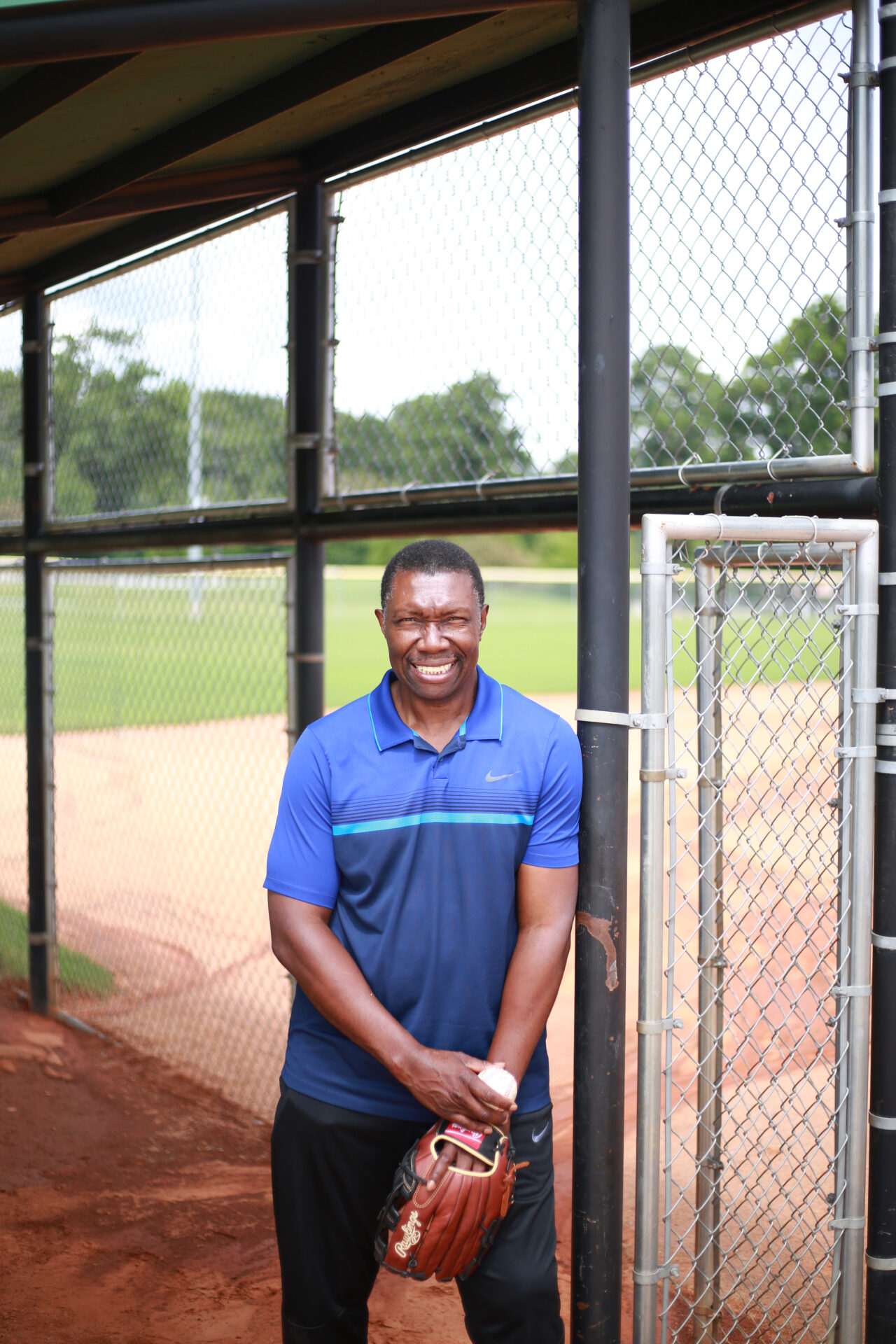
Although he was out of baseball as a player, baseball continued to provide him work. Soon after retirement, Terry parlayed his playing career into a job as a hitting instructor and outfield coach for the Braves organization. Stationed in Greenville, Terry worked with players on all levels. He gave Ron Gant a few tips and helped Chipper Jones to level his swing. “Once he leveled his swing out, the only year I worked with him in rookie ball, he just took off,” Terry said.
Terry’s job as a hitting coach offered him the opportunity to get to know the coordinator of the minor league hitting program: Willie Stargell. A Hall of Famer who played his entire career for the Pittsburgh Pirates, Stargell had been the Braves first-base coach during Terry’s playing tenure in Atlanta. Now as coaches, the two men spent significant time together discussing the nuances of the game. “We were good friends. We used to eat lunch and talk all the time about hitting,” Terry said. “Everybody knew him. You would never know he was Willie Stargell, Hall of Famer. That’s the kind of guy he was.”
By the time Terry was coaching, the franchise had completely turned its fortunes around, leading to a miraculous World Series run against the Minnesota Twins in 1991. Terry had helped many of the Braves’ hitters during spring training. “It made me feel good because at that time, no one thought they were going to do anything. To see them go to the World Series, shoot, I felt like I had a small part in it,” Terry said.
Turner did too, and made sure Terry got a ring.
But later that year, Terry was let go by Braves General Manager Chuck Lamar. Because his dismissal left a bad taste in his mouth, Terry began individual instructing in the community of East Cobb. Terry’s old friend, Brad Campbell, whom Terry had known since his high school days, soon invited him to be his hitting coach at a local school. Since that time, Terry has helped players on minor league teams, travel ball teams, high school teams, and college teams. He says he especially enjoys working with players who have borderline talent but possess the will to pay the price to get better.
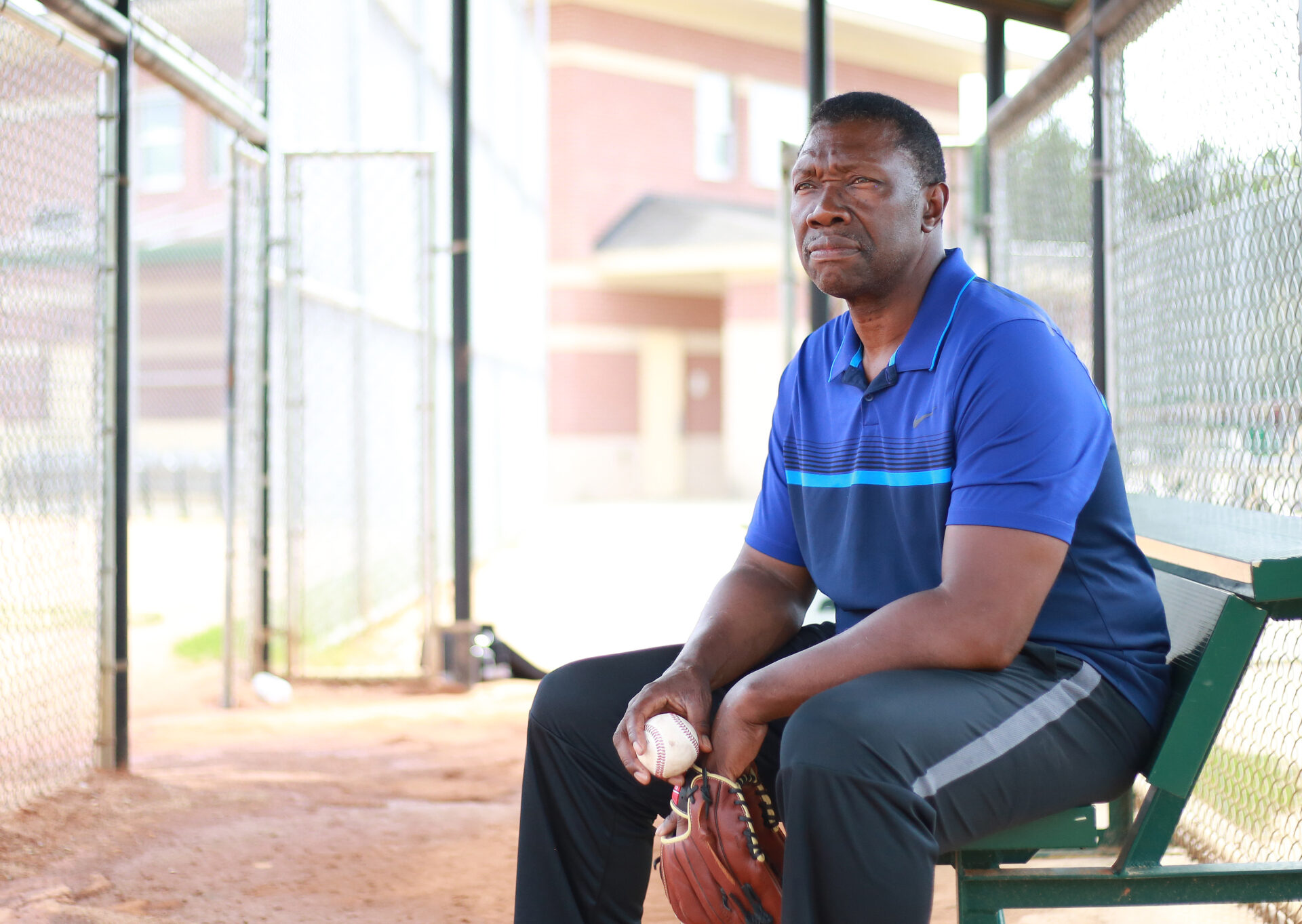
Terry Harper doesn’t want anything more than a small part. He doesn’t want the credit, doesn’t want his name boasted all over the green earth, doesn’t want people to talk about how great he is. And whether it’s a young kid trying to make his travel ball team, a high schooler looking to snag a college scholarship, or a Major Leaguer sharpening up his skills, Harper just wants to help kids get from Point A to Point B. “Whatever guys dreams are, hopefully I can be a small part in helping kids reach them,” he said.
For Terry, this selfless attitude stems largely from his faith, a belief that has been shaped since he was a little boy and is still encouraged by his 91-year old mother, who inquires when Terry visits her every Sunday afternoon, “Did you go to church? Do you know what the preacher talked about?”
“Faith is having God being a part of my life,” he says. “It’s a big part of my family.”
When asked what he would like people to remember about Terry Harper, he echoes the values instilled in him by his mother. “The baseball is great and all that came with it was great, but just being a good person, being a good family man, being a good dad,” he says. “That’s the biggest thing—God, family, and being able to help kids reach their dreams.”
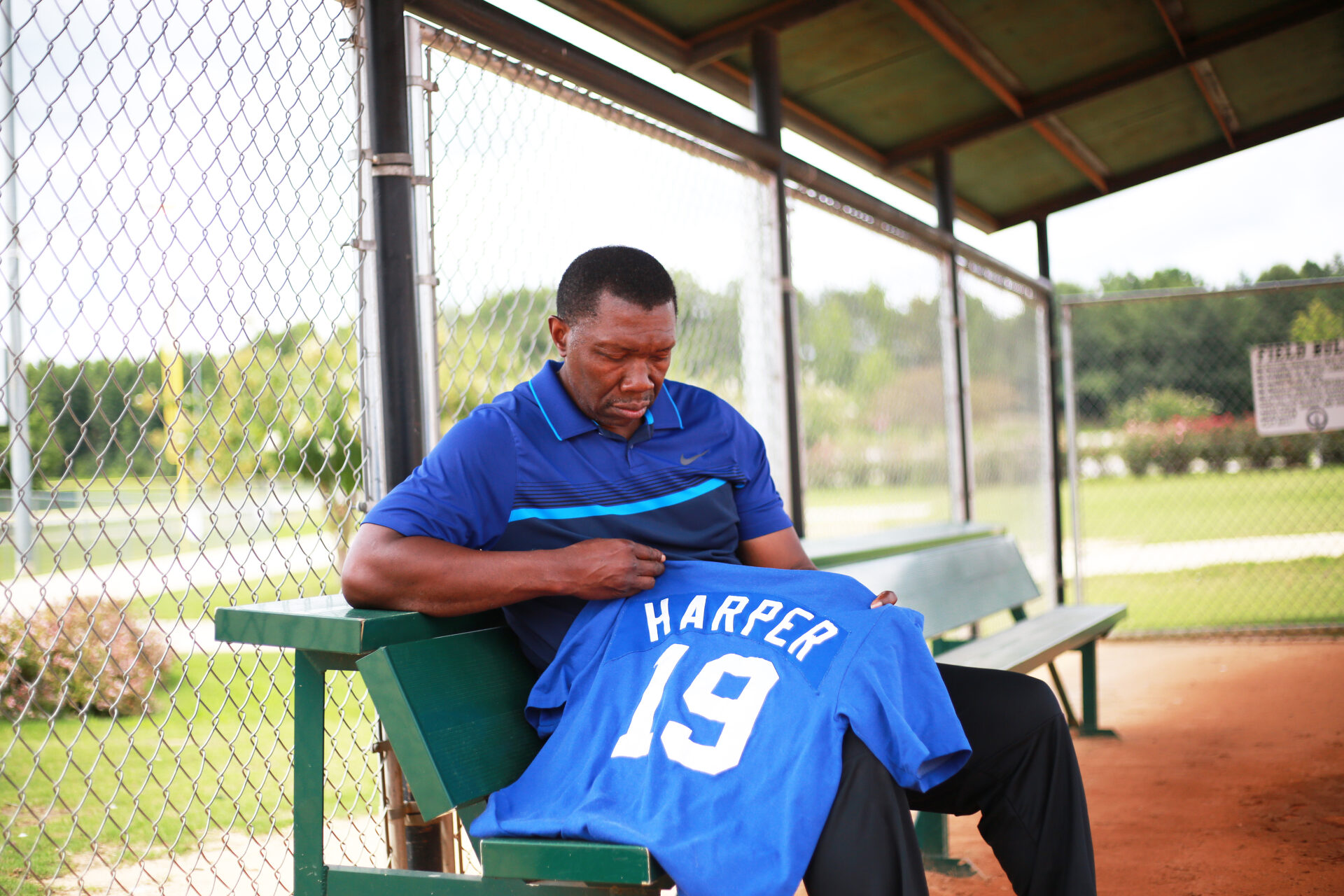
Several years ago, Terry’s father died unexpectedly in the night. It just so happened that the night he passed, Terry was visiting and the two men got to watch the Braves game together, one last time. Later that evening, Willie Joe Harper had a heart attack and passed away in his sleep. He was 79 years old.
As Terry said goodbye to his father, he didn’t have to worry about whether or not his father was proud of him. For Willie Joe, the synchronicity of watching his son play on his favorite team was the great thrill of his life.
“He loved that baseball,” Terry says, smiling and shaking his head. “He didn’t say a whole lot, but I knew he was proud.” H&A
Follow Hall & Arena on Facebook, Instagram, and Twitter @talegatesports

